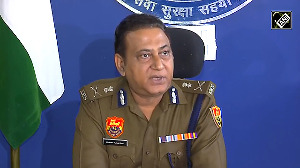Special Judge Pramod Dattaram Kode, who gained a reputation of being tough after he decreed death for a maximum number of people in any single criminal case, has shown his softer side too while presiding over the 1993 Mumbai serial blasts trial.
The 54-year-old Kode, who has sent 12 persons to the gallows, has never missed an opportunity to reach out to some of the 123 accused, of whom 100 have been convicted for the blasts that claimed the lives of 257 persons and injuring 713. He is one of the longest surviving judges in a single court, hearing the proceeding for over ten years.
A devotee of Shirdi Sai Baba, the special TADA judge has allowed the accused to go on Haj, carry table fans to the jail during summer and watch patriotic films on August 15 and January 26.
Considered a very sincere judge, Kode, who has been holding court since 1996 in a high security makeshift building in one of the corridors of Arthur Road jail, strictly believes that work is worship.
He reportedly never missed a day of work till the last week of June 2007 when he slipped in his bathroom and fractured his arm. On the advice of doctors, he took a few days off from perhaps the longest running criminal trial in the country.
Kode is the only judge to have an insurance cover of Rs 25 lakh, considering the sensitivity and magnitude of the trial. He is also the most protected judge in the state on the Z-security list.
Defence lawyer Farhana Shah, who represents the maximum number of accused (80) in the case, said when Kode's father died a few years ago, he came straight to the court after performing the last rites. When his mother passed away, he did not take leave.
There have been occasions when he would come on a holiday to pass an order to let an accused visit an ailing relative or attend a funeral.
Kode's thoroughness as a judge has been in evidence several times. For instance, he lambasted Sanjay Dutt for not reporting to the court post-9/11. The macho actor had to explain that he was stuck in the US since flight schedules had gone haywire after the World Trade Centre attacks.
The judge, who began reading out his judgment in September 2006, 12 years and eight months after the designated TADA court was formed, has faced occasional criticism for the trial taking too long, especially the time taken for delivering the verdict.
But Kode, who took over from J N Patel in March 1996 after the latter was elevated to the high court, said it was not possible for him to read out the entire verdict all at once and he decided to do it in phases.
Kode had a daunting task of sifting through 13,000 pages of oral evidence, 7,000 pages of documentary evidence and 6,700 pages of statements of the accused. There were a whopping 686 witnesses in the case.
With very few trials in the country's legal history to match the magnitude of the Mumbai blasts trial and its high profile nature, Kode's tenure as the special TADA judge has been free of controversy and he rarely lost his cool.
Besides awarding Capital punishment to 12 persons, Kode has given life imprisonment to 20. These persons were mostly convicted for conspiracy, preparing the bombs or planting explosive laden cars or scooters. He has given varying punishment to 67 other convicts for planning and abetting the attacks or for illegal possession of arms.
The social life of Kode has been restricted because of his Z plus security. Since he began hearing the case, Kode has received death threats, all of them through letters written mostly in unidentifiable Urdu the ask him to be 'rehemdil' (benevolent).
Kode, who watches Hindi movies and plays computer games in his spare time, has earned the respect of those accused, particularly because he has always listened to their point of view during court proceedings and reassured them about the issues they face. But on the issue of law, he has been very strict.
Kode has made some significant observations while awarding capital punishment to the convicts. For instance, he has said there cannot be any other sentence which is adequate but death. Once, he said the death row convicts were all "coveted members" of the conspiracy behind the Mumbai blasts.
Kode has also said death is an exception but it is awarded when life sentence is inadequate. On another occasion, he said, "Their( death row convicts) existence will cause danger in future and hence these are rarest of rare cases".
Kode started his career as a defence lawyer after graduating from the Government Law College in Mumbai. He became prosecutor in 1987 and later judge in civil and sessions court. He was promoted principal judge in 1993 and became the special TADA judge from March 1996.






 © 2025
© 2025